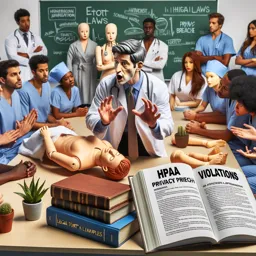Nursing is a vital profession in the healthcare industry, requiring specialized education and training. The path to becoming a nurse involves several educational steps, each offering different levels of responsibility and specialization. Here’s an overview of the various pathways and requirements in nursing education.
1. Certified Nursing Assistant (CNA)
- Education: CNA programs are typically offered at community colleges and vocational schools. These programs can be completed in a few months.
- Training: Includes both classroom instruction and hands-on clinical practice.
- Certification: Requires passing a state competency exam.
- Role: CNAs assist with basic patient care tasks, such as bathing, dressing, and feeding patients.
2. Licensed Practical Nurse (LPN) / Licensed Vocational Nurse (LVN)
- Education: LPN/LVN programs are usually one year long and are offered at community colleges and technical schools.
- Training: Combines classroom learning with supervised clinical experience.
- Licensing: Requires passing the National Council Licensure Examination for Practical Nurses (NCLEX-PN).
- Role: LPNs/LVNs provide basic medical care, such as taking vital signs, administering medications, and assisting with patient comfort.
3. Registered Nurse (RN)
- Education: There are multiple pathways to becoming an RN:
- Associate Degree in Nursing (ADN): A 2-3 year program offered at community colleges.
- Bachelor of Science in Nursing (BSN): A 4-year program offered at universities.
- Training: Both ADN and BSN programs include extensive clinical practice.
- Licensing: Requires passing the National Council Licensure Examination for Registered Nurses (NCLEX-RN).
- Role: RNs have a broader scope of practice, including patient assessment, creating care plans, administering treatments, and educating patients and families.
4. Advanced Practice Registered Nurse (APRN)
- Education: APRNs must first obtain a BSN and then pursue a Master’s of Science in Nursing (MSN) or Doctor of Nursing Practice (DNP). This advanced education typically takes an additional 2-4 years.
- Specializations: APRNs can specialize in fields such as Nurse Practitioner (NP), Clinical Nurse Specialist (CNS), Nurse Anesthetist (CRNA), and Nurse Midwife (CNM).
- Licensing and Certification: Requires additional certification in their specialty area.
- Role: APRNs have advanced clinical training and can perform many tasks similar to those of physicians, including diagnosing and treating illnesses, prescribing medications, and managing patient care.
5. Continuing Education and Professional Development
- Importance: Continuing education is crucial for nurses to keep up with the latest medical advancements and maintain their licenses.
- Opportunities: Nurses can attend workshops, conferences, and online courses to enhance their skills and knowledge.
The Importance of Accreditation
When choosing a nursing program, it’s essential to ensure that it is accredited by recognized accrediting bodies, such as the Accreditation Commission for Education in Nursing (ACEN) or the Commission on Collegiate Nursing Education (CCNE). Accreditation ensures that the program meets high standards of education and prepares students for the licensing exams.
Conclusion
Nursing education is a comprehensive journey that prepares individuals to provide high-quality patient care in various healthcare settings. Each level of nursing education opens up new opportunities and responsibilities, making it possible for nurses to advance their careers and specialize in areas that align with their interests and skills.



















